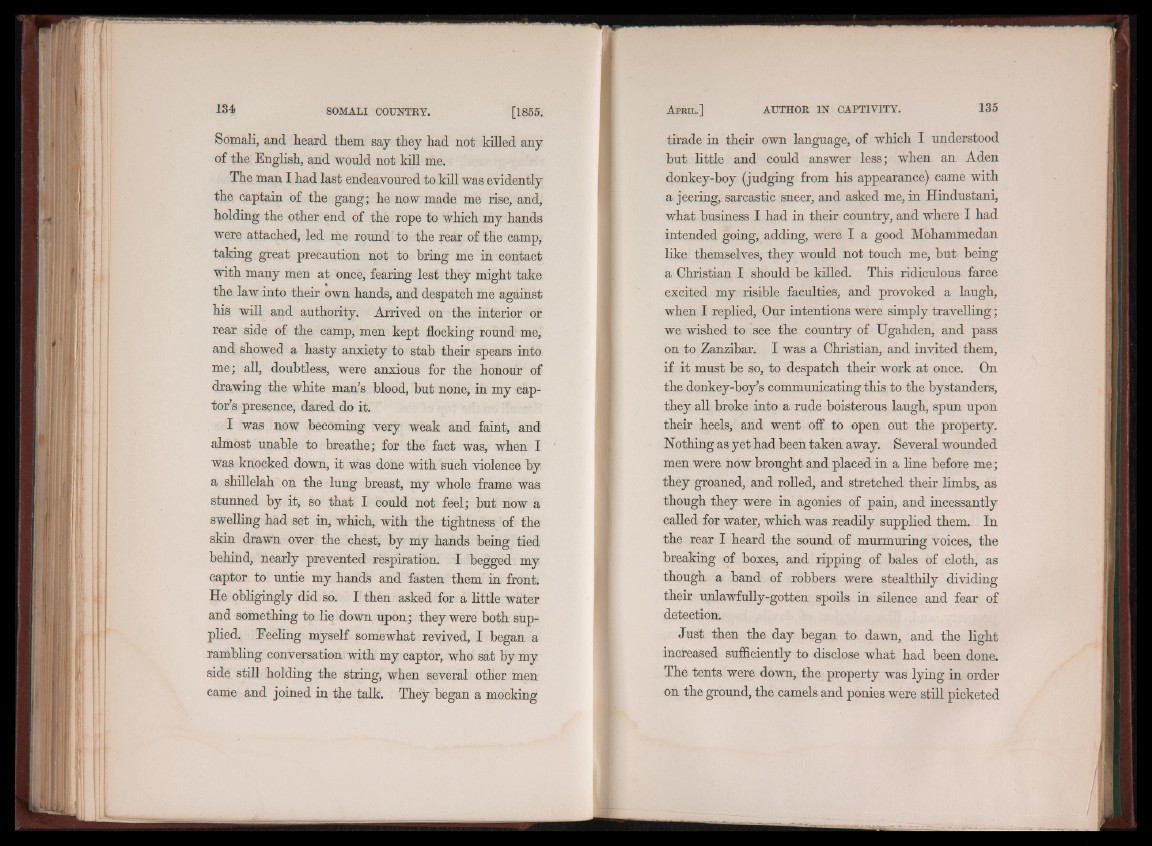
Somali, and heard them say they had not killed any
of the English, and would not kill me.
The man I had last endeavoured to kill was evidently
the captain of the gang; he now made me rise, and,
holding the other end of the rope to which my hands
were attached, led me round to the rear of the camp,
taking great precaution not to bring me in contact
with many men at once, fearing lest they might take
the law into their own hands, and despatch me against
his will and authority. Arrived on the interior or
rear side of the camp, men kept flocking round me,
and showed a hasty anxiety to stab their spears into
me; all, doubtless, were anxious for the honour of
drawing the white man’s blood, hut none, in my captor’s
presence, dared do it.
I was now becoming very weak and faint, and
almost unable to breathe; for the fact was, when I
was knocked down, it was done with such violence by
a shillelah on the lung breast, my whole frame was
stunned by it, so that I could not feel; but now a
swelling had set in, which, with the tightness of the
skin drawn over the chest, by my hands being tied
behind, nearly prevented respiration. I begged my
captor to untie my hands and fasten them in front.
He obligingly did so. I then asked for a little water
and something to lie down upon; they were both supplied.
Feeling myself somewhat revived, I began a
rambling conversation with my captor, who sat by my
side still holding the string, when several other men
came and joined in the talk. They began a mocking
tirade in their own language, of which I understood
but little and could answer less; when an Aden
donkey-boy (judging from his appearance) came with
a jeering, sarcastic sneer, and asked me, in Hindustani,
what business I had in their country, and where I had
intended going, adding, were I a good Mohammedan
like themselves, they would not touch me, but being
a Christian I should be killed. This ridiculous farce
excited my risible faculties, and provoked a laugh,
when I replied, Our intentions were simply travelling;
we wished to see the country of Ugahden, and pass
on to Zanzibar. I was a Christian, and invited them,
if it must be so, to despatch their work at once. On
the donkey-boy’s communicating this to the bystanders,
they all broke into a rude boisterous laugh, spun upon
their heels, and went off to open out the property.
Nothing as yet had been taken away. Several wounded
men were now brought and placed in a line before me;
they groaned, and rolled, and stretched their limbs, as
though they were in agonies of pain, and incessantly
called for water, which was readily supplied them. In
the rear I heard the sound of murmuring voices, the
breaking of boxes, and ripping of bales of cloth, as
though a band of robbers were stealthily dividing
their unlawfully-gotten spoils in silence and fear of
detection.
Just then the day began to dawn, and the light
increased sufficiently to disclose what had been done.
The tents were down, the property was lying in order
on the ground, the camels and ponies were still picketed